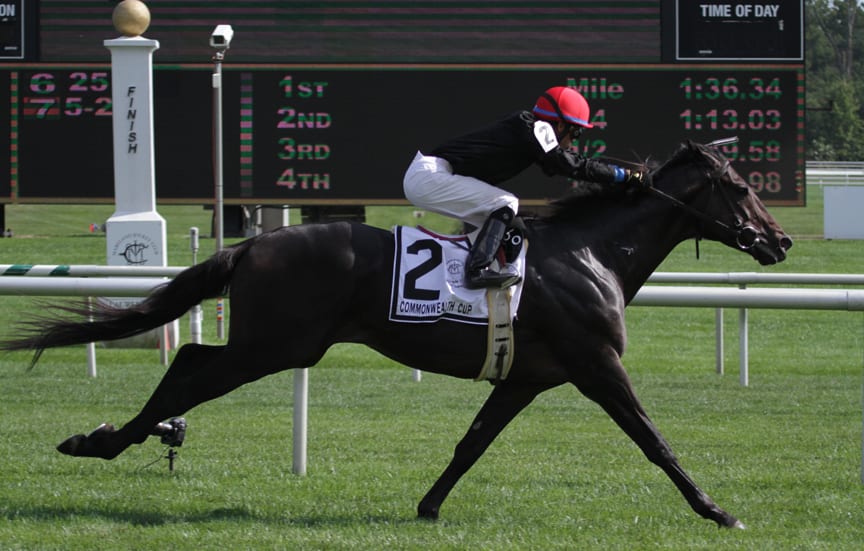Photo, of Mr. Speaker winning the 2015 Commonwealth Cup, by Laurie Asseo.
by Frank Vespe
The revitalization of the D.C. International took an important step forward in Annapolis last week — and may be about to take another key step, this one in Richmond.
HB 965, a bill that would direct $500,000 of state funding to support a “Maryland International” turf race breezed through the House Ways and Means Committee March 10, forwarded to the full House of Delegates on a 19-0 vote.
From its inception in 1952 until its 1994 demise, the Washington, DC International was annually one of the nation’s most important grass races, an event won by such greats as Dahlia, All Along, Kelso, and Bowl Game.
The bill would also target up to $600,000 in bonuses towards Maryland-breds that win or earn purse money in the Preakness Stakes. The bill grants a $500,000 bonus to a Maryland-bred that wins the Preakness — the last to do so was Deputed Testamony in 1983 — and up to $100,000 to a Maryland-bred that finishes in the top five in the Preakness. All of the money would come from the State Lottery and Gaming Control Agency’s marketing budget.
“We have a horse industry that’s healthy,” said Delegate Jay Walker, the bill’s sponsor, in a hearing. “But we need to be proactive rather than reactive.”
Next stop: the full House.
Yet a key question remains: even if the money is available, since graded races don’t grow on trees, where would the Maryland Jockey Club find a race to make the modern-day International work?
The answer may lie south of the Potomac: the $250,000 Grade 2 Commonwealth Cup.
“You can’t just create a Grade 1, and it’s so hard to get a Grade 1, even a Grade 2,” said Maryland Jockey Club (MJC) president and general manager Sal Sinatra. “So that’s the precursor race.”
Sinatra told the Maryland Racing Commission today at its monthly meeting that he was working with Virginia horsemen on a deal that would allow the MJC to take over ownership of the Commonwealth Cup. If that deal comes to fruition, it would allow the MJC to sidestep the time-consuming process of obtaining a grade for the International; races cannot even be considered for grading until they have been run at least twice, and races typically have to move through the process grade-by-grade.
The Turf Cup has been run 10 times but was not run in 2014, when Colonial Downs and the Virginia Horsemen’s Benevolent and Protective Association (HBPA) were locked in a dispute that has kept the track dark since 2013.
Last year, the HBPA ran the three graded events formerly run at Colonial — the Commonwealth Cup, Grade 2 Commonwealth (formerly Virginia) Derby, and the Grade 3 Commonwealth (formerly Virginia) Oaks — at Laurel Park during the track’s fall meeting. That allowed the races to retain their graded status, which they lose if they are not contested for two consecutive years or twice in a three-year period.
Sinatra said that the Virginia Racing Commission was reluctant this year to allow the horsemen to fund the three races fully — they cost a combined total of $800,000 last year — but when he pointed out that failing to run the races this year would cause them to lose their grades, thus rendering the efforts to salvage them last year moot, the HBPA responded with a plan to save the two three-year-old races, the Derby and the Oaks.
Under that proposal, Maryland and Virginia would split the cost of the purses, though the money generated by parimutuel handle would stay in Maryland.
But that proposal would have left the Commonwealth Cup out in the cold altogether.
“I said, ‘What are you going to do with the other race?'” Sinatra said after the Commission meeting. “They said that that one won’t get used. I said, ‘Can I have that race – I need something to give my horsemen?’ They met and they said that seemed like a reasonable deal.”
If the Maryland Thoroughbred Horsemen’s Association’s board agrees to the proposal — Sinatra said preliminary conversations have been positive — then he will return to Virginia, and if the HBPA endorses the plan, it will bring it to the Virginia Racing Commission.
“They go back to the Commission and say, ‘Look, we came up with this happy medium,’ and everybody should be fine with it,” Sinatra said. “We’re helping and working with them.”
And that, coupled with the legislation pending in Annapolis, would put the International back on the fast track and give Maryland a fall event to complement the spring’s showcase, the Grade 1 Preakness.
“If you could bookend the Maryland racing calendar with these two gigantic events,” said Maryland Horse Breeders Association president Josh Pons at the legislative hearing, “we would stabilize our industry so far into the future.”









